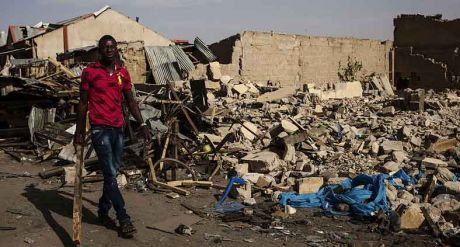Shared
You are here
Poverty in Nigeria fuels Boko Haram—and force will not stop it

May 14, 2014
Baba Aye of the Socialist Workers League in Nigeria explains the roots of the Islamist group Boko Haram and says military action against it is bound to fail
The kidnapping of 200 schoolgirls by Boko Haram has finally roused the Nigerian government into tough speeches. But the kind of action it proposes has already proved to be counter-productive. In response to a wave of Boko Haram attacks, the government declared a state of emergency in April last year across the three most northeastern of Nigeria’s 36 states—Borno, Adamawa, and Yobe.
Yet this only increased the levels of violence. According to Amnesty International at least 1,500 people have been killed since then—almost half by the military. The extent of army killing of civilians is really scaring people now.
If we just say Boko Haram bad, government good, we will not understand what is responsible for its growth. Ministers present the Islamist group Boko Haram as a military security issue. But that’s absurd. Social and economic insecurity built it, and it feeds on rising levels of poverty and inequality. The group gets support from tens of thousands of people who feel abandoned by Nigeria’s Western-backed elite. That is bigger than most trade unions in the country.
The group fuses sections of the middle class together with some of the poor masses. But a number among the elite also support it. Ali Modu Sheriff courted Boko Haram in his successful bid for the governorship of Borno state in 2003. Mohammed Ali Ndume has been accused of being its main financier. Both men are senators, a position that carries more status that a British MP.
Poor
The middle class provide the group’s ideological leaders, but without the poor people who give them cover it would be impossible to keep going. This is true not only in its core areas, such as Borno, but also in the working class district of Nyanya, in the suburbs of the capital. Boko Haram has a cell operating there which has recently carried out at least two bombings.
The government’s emergency laws must be renewed every six months. But now even some of the local elite are against them because of the upwards spiral of violence. Alhaji Murtala Nyako, governor of Adamawa and a former vice-admiral, alleges that the military’s JTS taskforce is engaging in genocide in the areas at the heart of the fighting.
In response, some young men in the Maiduguri, the capital of Borno, are organising a “Civilian JTS”—which has seriously reduced Boko Haram’s activities in the areas where it is active. This is much preferable to military control, but it’s contradictory. The group see themselves as a civilian extension of the state and don’t yet understand that the state and Boko Haram are two sides of the same coin.
Without the self-activity of the working masses the situation cannot be changed. For us socialism or barbarism is not a question that might arise in the future. It is the choice in Nigeria today.
This is republished from Socialist Worker (UK)
Memcache statistics
Operation
Bin
Key
Hit
get
cache_bootstrap
cache_bootstrap-variables
1
get
cache_bootstrap
cache_bootstrap-bootstrap_modules
1
get
cache_bootstrap
cache_bootstrap-lookup_cache
1
get
cache_bootstrap
cache_bootstrap-system_list
1
get
cache_bootstrap
cache_bootstrap-module_implements
1
get
cache_path
cache_path-ckeditor%2Fxss
get
cache
cache-context
1
getMulti
cache
cache-.wildcard-context
1
get
cache
cache-ctools_plugin_type_info
1
getMulti
cache
cache-.wildcard-ctools_plugin_type_i
0
get
cache
cache-plugins%3Acontext%3Aplugins
1
getMulti
cache
cache-.wildcard-plugins%3Acontext
1
get
cache
cache-schema%3Aruntime%3A
1
getMulti
cache
cache-.wildcard-schema%3A
1
get
cache
cache-context
1
set
cache
cache-context
get
cache
cache-context
1
set
cache
cache-context
get
cache
cache-filter_formats%3Aen
1
get
cache
cache-filter_list_format
1
get
cache
cache-theme_registry%3Aworker
1
getMulti
cache
cache-.wildcard-theme_registry
1
Section:
Topics:










